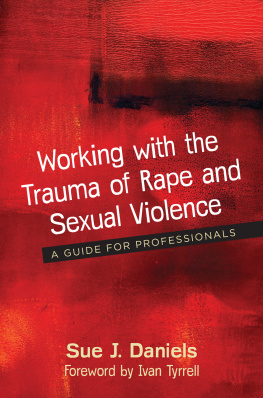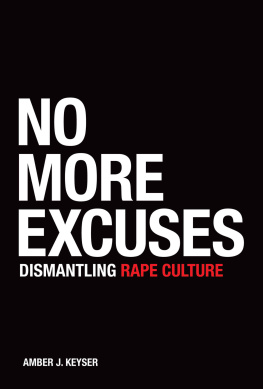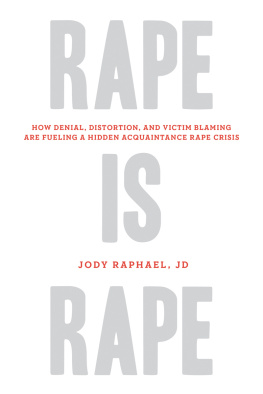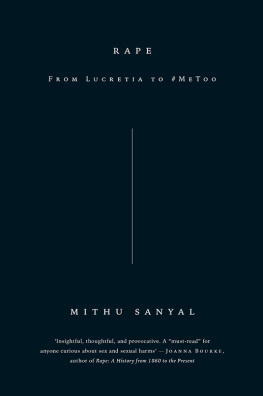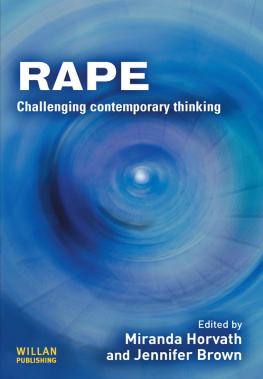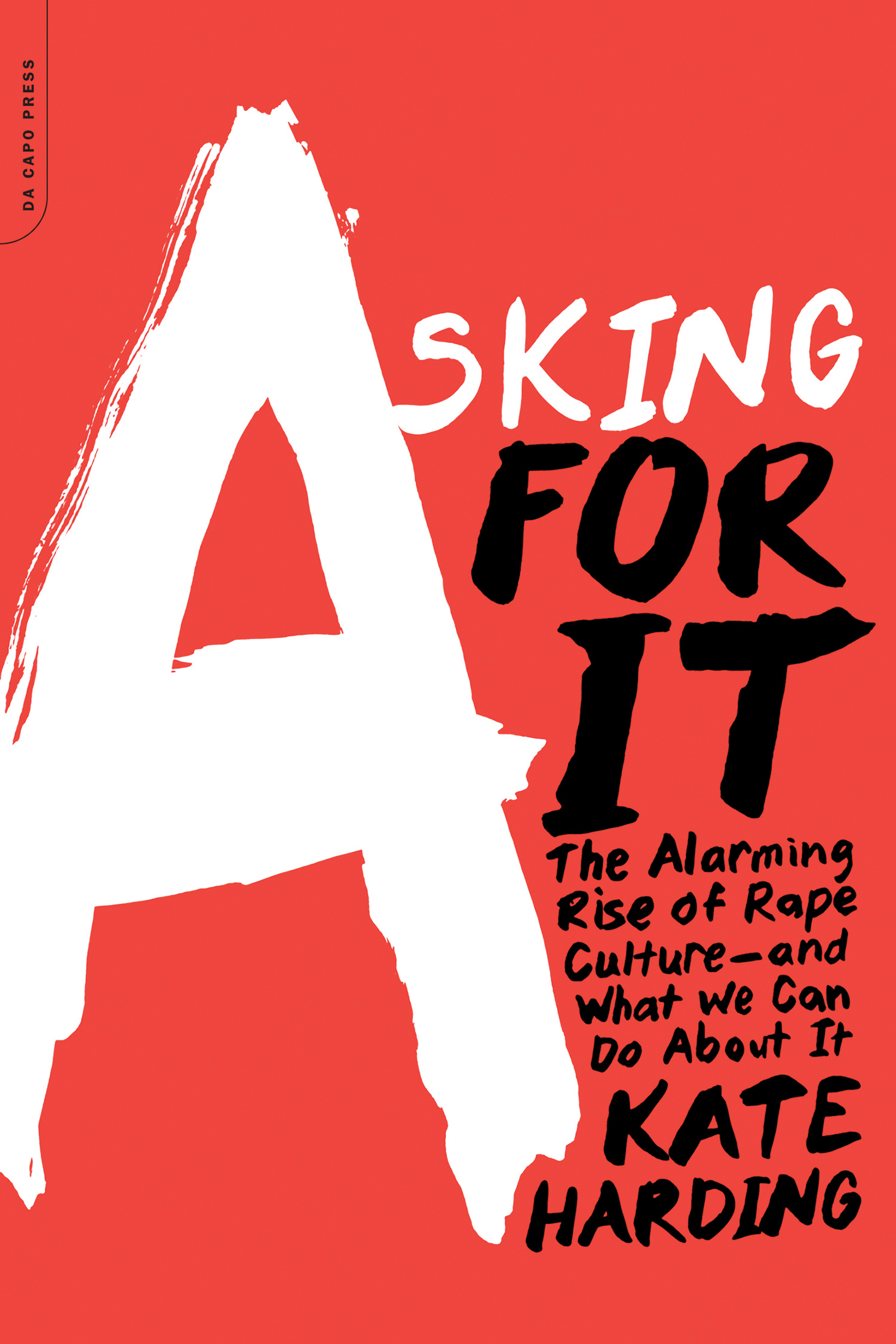Also by Kate Harding
The Book of Jezebel (wit h Anna Holmes and Amanda Hess)
Lessons from the Fat-o-Sphere: Quit Dieting and Declare a Truce with Your Body (with Marianne Kirby)
Copyright 2015 by Kate Harding
All rights reserved. No part of this publication may be reproduced, stored in a retrieval system, or transmitted, in any form or by any means, electronic, mechanical, photocopying, recording, or otherwise, without the prior written permission of the publisher. Printed in the United States of America. For information, address Da Capo Press, 44 Farnsworth Street, 3rd Floor, Boston, MA 02210
Designed byJack Lenzo
Set in 11-point Kennerly by the Perseus Books Group
Library of Congress Cataloging-in-Publication Data
Harding, Kate, 1975
Asking for it : the alarming rise of rape culture--and what we can do about it / Kate Harding.
pages cm
Includes bibliographical references and index.
ISBN 978-0-7382-1703-1 (e-book)
1. Sexual harassment of women. 2. Rape. 3. WomenCrimes against. I. Title.
HV6556.H37 2015
364.1532--dc23
2015012298
First Da Capo Press edition 2015
Published by Da Capo Press
A Member of the Perseus Books Group
www.dacapopress.com
Note: The names and identifying details of people associated with certain events described in this book have been changed. Any similarity to actual persons is coincidental.
Da Capo Press books are available at special discounts for bulk purchases in the U.S. by corporations, institutions, and other organizations. For more information, please contact the Special Markets Department at the Perseus Books Group, 2300 Chestnut Street, Suite 200, Philadelphia, PA, 19103, or call (800) 810-4145, ext. 5000, or e-mail special.markets@perseusbooks.com.
10 9 8 7 6 5 4 3 2 1
For every Jane Doe
From time immemorial the rule has been not to punish the male offender, but to get the victim out of his way.
Susan B. Anthony, 1896
Contents
Slut Shaming, Victim Blaming, and Rape Myths
The Power of Myth
Simple Safety Tips for Ladies
Not-So-Innocent Bystanders
The Problem of False Accusations
Law and Order
To Serve and Protect
Unreasonable Doubts
The Politics of Rape
The Culture of Rape
Virgins, Vamps, and the View from Nowhere
Pop Rap
Trolls, Gamers, and the New Misogyny
Reasons for Hope
T he term rape culture has been in use at least since the late 1970s, but for obvious reasons, its been slow to enter mainstream parlance. It sounds so extreme at first that I confess even I, a proud feminist, initially balked at the term. Rape culture? Isnt that overstating things just a smidge?
And isnt such overblown terminology the kind of thing that makes people call feminists humorless and strident, and accuse us of holing up in our ivory towers, theorizing about human behavior without ever witnessing much of it?
I mean, granted, we live in a culture that claims to abhor rape yet adores jokes about the prisoner who drops the soap, the trans woman who discloses to a date that she has a penis and gets punished for it, the altar boy who follows a priest into a back room. A culture in which laws and norms prohibiting sexual harassment in the workplace have been strenuously opposed by folks seeking to protect that fundamental civil liberty: objectifying and humiliating your subordinates.
And sure, yes, its a culture that rewards men for bagging as much anonymous pussy as possible, while condemning women for expressing any sexual impulses at all. A culture in which a young womans supposed friends will videotape her being violated and then use it as evidence that shes a slut. A culture in which most victims of sexual assault and rape never report it because they fear they wont be believedand know that even if they are believed, theyre likely to be mortified and harassed, blamed and shamed, throughout a legal process that ultimately leads nowhere.
Also, we live in a culture in which a lot of people think were too rough on tortured geniuses like Roman Polanski, who pled guilty to raping a thirteen-year-old girl, and Woody Allen, who at the very least took naked pictures of his long-term partners teenage daughter when he was in his fifties, and whose own daughter has consistently maintained that he molested her. Both men have continued to have long, wildly remunerative and award-winning careers since those pesky facts came to light, all the while enjoying the support and company of our cultural elite. But one of them had to do it all outside the United States, and the other has frequently been the victim of jokes and criticism by people who have no power to interfere with his life, liberty, or pursuit of happiness. So havent they suffered enough?
Fighter Mike Tyson was convicted of rape and served time for it, but jeez, that was all such a long time agodid you see his cameo in The Hangover ? Or maybe the episode of the sitcom How I Met Your Mother , in which he was portrayed as a kind, gentle soul with whom youd gladly leave your baby? Or how about the episode of Law & Order: Special Victims Unit a show about how difficult it is to catch and convict sex offendersin which Tyson played a victim of sexual abuse? What an amusingly ironic bit of casting! Wink, wink.
Surely, like all criminals who pay their debt to society and must overcome the stigma of a felony conviction upon their release, Tyson has earned Hollywoods extensive efforts to rehabilitate his image, while paying him lots of money just to show up in front of cameras.
I could go on. I will go on, in fact, for the length of a book. But I trust youre getting the picture.
A Crime Unlike Any Other
In the preamble to their 1993 anthology Transforming a Rape Culture , feminist scholars Emilie Buchwald, Pamela R. Fletcher, and Martha Roth write, In a rape culture, women perceive a continuum of threatened violence that ranges from sexual remarks to sexual touching to rape itself. A rape culture condones physical and emotional terrorism against women and presents it as the norm.
Terrorism . Again, its a bold, shocking choice of words, but not much of an exaggeration. We tend to imagine rapists, like terrorists, as an omnipresent and often unidentifiable threat, everywhere and nowhere at once. Since we dont know exactly who will strike or when, we agree that the best we can do is try to avoid victimhood. We put pressure on potential targets to volunteer for safety rituals that create the illusion of security while quietly eroding our freedom: airline passengers submit to groping by strangers for the sake of thwarting terrorism, and average women restrict their movements and clothing for the sake of thwarting strangers who aim to grope them. Like post-9/11 exhortations for passengers to fight back against skyjackers or die trying, our ostensibly empowering advice to women is to learn self-defense, to plan on disabling potential attackers at the first sign of any impropriety.
The part wed prefer not to talk about, the part thats much less empowering than praising the twin pillars of feminine vigilance and martial arts, is that there will still be victims in this scenario. (Not all of them women, by the way.) Our culture is not equipped to prevent their being attacked, and adding insult to injury, our system is not equipped to bring all of their attackers to justice. Hell, our system isnt even entirely sure what that would mean at this point.


